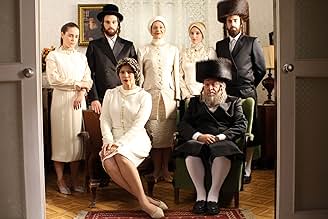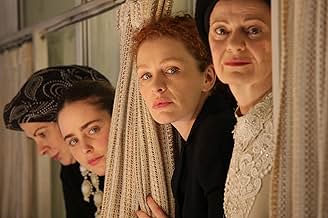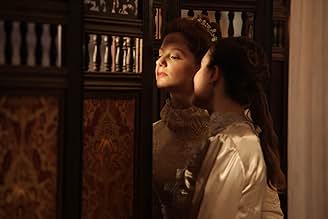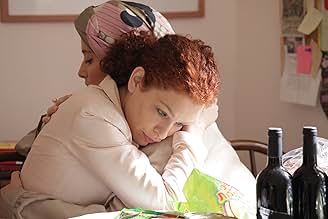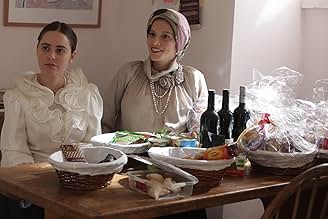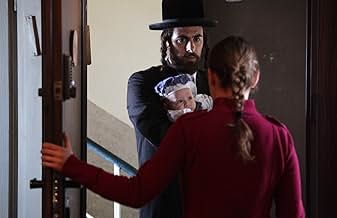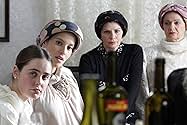AVALIAÇÃO DA IMDb
6,7/10
4,1 mil
SUA AVALIAÇÃO
Adicionar um enredo no seu idiomaWhen the older sister of Shira, an 18-year-old Hasidic Israeli, dies suddenly in childbirth, Shira must decide if she can and should marry her widowed brother-in-law, which also generates te... Ler tudoWhen the older sister of Shira, an 18-year-old Hasidic Israeli, dies suddenly in childbirth, Shira must decide if she can and should marry her widowed brother-in-law, which also generates tensions within her extended family.When the older sister of Shira, an 18-year-old Hasidic Israeli, dies suddenly in childbirth, Shira must decide if she can and should marry her widowed brother-in-law, which also generates tensions within her extended family.
- Prêmios
- 14 vitórias e 16 indicações no total
Avaliações em destaque
As a watcher of many movies I often find myself bored at watching the same tired clichés recycled over and over and packaged as original movies.
Thats why i was refreshed to watch this movie- a film that has an original story and gives us a look at a different world.
I found the casting to be excellent. The male lead was strong & handsome and inhabited his role with controlled emotion and dignity. The female lead was beautiful in an innocent way and her demure manner and emotional expressions were well suited for her role.
Well done & thanks for a good film experience!
Thats why i was refreshed to watch this movie- a film that has an original story and gives us a look at a different world.
I found the casting to be excellent. The male lead was strong & handsome and inhabited his role with controlled emotion and dignity. The female lead was beautiful in an innocent way and her demure manner and emotional expressions were well suited for her role.
Well done & thanks for a good film experience!
10clg238
This is a gorgeous film. The cinematography, largely revealing closeups of the characters, is stunning, bringing us close in to an unfamiliar world, an insular, deeply religious culture. The acting is flawless. But what brings me to give this film a top rating is the story, one of moral complexity--life, after all, is complicated, a truism that Hollywood films fail miserably in addressing, the rare times they attempt to do so (perhaps "The Master" and "Doubt" are exceptions). A young, innocent woman desires to make a marriage match that is in accordance with her Jewish Orthodox tradition and yet in some ineffable way is personally to her taste. At first this seems possible, but unforeseen circumstances make her choice of marriage partner difficult. She is not just choosing for herself and potential partner but her choice is central to the happiness or unhappiness of relatives and friends—a situation of which she is acutely aware. How can she make the right choice for everyone, herself included? In a culture seeped in moral values, the moral answer to her dilemma is not an easy one. It has been a long time since I've been so deeply moved by a film.
Put aside what you think you know or don't know about the inner world of an orthodox Chassidic community in Tel Aviv, and let Rama Burshtein weave a story that is believable, engrossing, and rich with nuance and subtlety... the timeless themes found in a community which lives in the past, the excellent acting, direction and casting, will have you quickly absorbed in this terrific film.
If you are looking to vent your critique or holier than thou judgments of Jewish Orthodoxy, you may feel a bit humbled by the humanity found behind the long dresses, black robes and covered heads. The portrayal of the rabbi is an especially tender reflection of some one who is indeed spiritual, in the most human sense.
If you are looking to vent your critique or holier than thou judgments of Jewish Orthodoxy, you may feel a bit humbled by the humanity found behind the long dresses, black robes and covered heads. The portrayal of the rabbi is an especially tender reflection of some one who is indeed spiritual, in the most human sense.
Set in an orthodox Hasidic Jewish community in Tel Aviv, FILL THE VOID centers around eighteen-year-old Shira's (Haldas Yaron), decision about whether to marry widower Yochay (Yiftach Klein) or not. Yochay was already married to her sister Esther (Renana Raz), but sadly Esther passed away during childbirth. The title sums up the film's principal theme: by following her family's fishes, Shira will fill the void created by Esther's passing, and hence become a good mother to Esther and Yochay's newly-born son Mordecai. Morally speaking, she believes she is doing the right thing by accepting Yochay's offer, but director Rama Burshtein asks us to reflect on whether the decision will fill the void in Shira's life, or simply deepen it. Issues of love never seem to enter Shira's mind; she believes she is obliged to marry, and hence works hard to persuade the rabbi (Melech Thal) to sanction her decision. The film is tightly constructed as a series of close-ups and two-shots: the camera gives us a unique insight into Shira's turbulent state of mind, as she sits opposite Yochay, her head bowed, her lip quivering as she tries her best to maintain a facade of calm. Her family offer her a limited amount of support, but it's clear that they are forcing her into marriage. The only way she can obtain succor is to pray to God: in one sequence she is photographed from above, her eyes staring into the camera, as she tries to listen to His word. The ending is quite achingly poignant; in her wedding dress, Shira looks stunningly beautiful, but she cannot sit still. Her body repeatedly rocks from left to right, almost as if she is trying to lull herself into a trance- like state to cope with her forthcoming ordeal. Burshtein cuts to the wedding ceremony, where her head is covered with a white sheet; she is quite literally blinded to what follows, while the families celebrate. The film ends with the now-married couple alone after the ceremony has concluded. They stand at either end of the room and Shira stares blankly into space, underlining the irony inherent in the film's title. A low-key film, but totally compelling nonetheless.
Israeli director Rama Burshtein's powerfully moving Fill the Void, Israel's submission to the 2012 Oscars, is about love and marriage but, in the Orthodox Hasidic community in Tel Aviv, they do not necessarily go together like a horse and carriage. Hadas Yaron, winner of the Best Actress Award at the Venice Film Festival in her first film role, is eighteen year-old Shira who is very close to being matched and promised to a local young man. When her older sister Esther (Renana Raz) dies in childbirth, however, her husband, the striking-looking Yochay (Yiftak Klein), is left to raise his young son Mordecai by himself and, according to tradition, has a duty to remarry once the formal mourning period is over.
This is where the film's central dilemma comes in and Shira's choice to "do the right thing" is severely tested by conflicting loyalties. After her family celebrates the Jewish holiday Purim, Shira and her mother, Rivka (Irit Sheleg) in a scene with Woody Allen overtones, are sent by the matchmaker to "shop" in the supermarket to find a suitable husband. When the right man is found, arrangements are made, even though Shira does not actually meet the young man until later in the film. When her mother learns that Yochay has a marriage offer from a widow living in Belgium, however, and cannot face the idea of the baby being taken away, she asks the matchmaker Mr. Shtreicher (Michael David Weigl) to arrange for Shira to marry Yochai, who is ten years older.
Fill the Void is a heartfelt and intimate look inside a world few of us ever have contact with. Sensitive to the orthodox community's rituals and traditions, however anachronistic they may seem to us, there is a feeling behind the rituals that binds people together and produces a feeling of closeness in the community, underscored by the rhythmic chants and joyous celebrations of special occasions. Though the purpose of every girl is to be married may seem offensive, in the culture in which it takes place, it is not demeaning, and the film does not stand in judgment of its characters or of the community.
As director Rama Buhrstein, a member of the Orthodox community herself, describes the film, "It's not about being an anthropologist or about religion or secularism. Rather, it's about the heart." Shira is asked to choose between her sense of duty to her family and community and her desire to fulfill her own dreams. Throughout the process, however, she is not alone and is always surrounded by love and support from mothers, fathers, aunts, rabbis, even though their advice may be conflicting. Her affectionate Aunt Hanna (Razia Israeli), who never married because of a disability, encourages Shira to do what is right for herself, putting her at odds with her mother.
Shira's older unwed cousin Frieda (Hila Feldman) tells her that it was Esther's wish that she marry Yochay if anything should happen to her, a proposition Yochay rebels at. Sensing Shira's confusion and uncertainty about marrying Yochay, however, the chief Rabbi (Melech Thal) refuses to bless the marriage. Even as many emotions seem to be happening all at the same time, the resolution of the conflict is poignant and even beautiful and it all comes together in a memorable final shot.
This is where the film's central dilemma comes in and Shira's choice to "do the right thing" is severely tested by conflicting loyalties. After her family celebrates the Jewish holiday Purim, Shira and her mother, Rivka (Irit Sheleg) in a scene with Woody Allen overtones, are sent by the matchmaker to "shop" in the supermarket to find a suitable husband. When the right man is found, arrangements are made, even though Shira does not actually meet the young man until later in the film. When her mother learns that Yochay has a marriage offer from a widow living in Belgium, however, and cannot face the idea of the baby being taken away, she asks the matchmaker Mr. Shtreicher (Michael David Weigl) to arrange for Shira to marry Yochai, who is ten years older.
Fill the Void is a heartfelt and intimate look inside a world few of us ever have contact with. Sensitive to the orthodox community's rituals and traditions, however anachronistic they may seem to us, there is a feeling behind the rituals that binds people together and produces a feeling of closeness in the community, underscored by the rhythmic chants and joyous celebrations of special occasions. Though the purpose of every girl is to be married may seem offensive, in the culture in which it takes place, it is not demeaning, and the film does not stand in judgment of its characters or of the community.
As director Rama Buhrstein, a member of the Orthodox community herself, describes the film, "It's not about being an anthropologist or about religion or secularism. Rather, it's about the heart." Shira is asked to choose between her sense of duty to her family and community and her desire to fulfill her own dreams. Throughout the process, however, she is not alone and is always surrounded by love and support from mothers, fathers, aunts, rabbis, even though their advice may be conflicting. Her affectionate Aunt Hanna (Razia Israeli), who never married because of a disability, encourages Shira to do what is right for herself, putting her at odds with her mother.
Shira's older unwed cousin Frieda (Hila Feldman) tells her that it was Esther's wish that she marry Yochay if anything should happen to her, a proposition Yochay rebels at. Sensing Shira's confusion and uncertainty about marrying Yochay, however, the chief Rabbi (Melech Thal) refuses to bless the marriage. Even as many emotions seem to be happening all at the same time, the resolution of the conflict is poignant and even beautiful and it all comes together in a memorable final shot.
Você sabia?
- CuriosidadesHadas Yaron had to lie to get out of her military duty to audition for the film.
- ConexõesFeatured in At the Movies: Venice Film Festival 2012 (2012)
- Trilhas sonorasIm Eshkachech Yerushalayim
(uncredited)
Principais escolhas
Faça login para avaliar e ver a lista de recomendações personalizadas
- How long is Fill the Void?Fornecido pela Alexa
Detalhes
Bilheteria
- Faturamento bruto nos EUA e Canadá
- US$ 1.775.316
- Fim de semana de estreia nos EUA e Canadá
- US$ 59.164
- 26 de mai. de 2013
- Faturamento bruto mundial
- US$ 3.197.615
- Tempo de duração
- 1 h 30 min(90 min)
- Cor
- Mixagem de som
- Proporção
- 2.35 : 1
Contribua para esta página
Sugerir uma alteração ou adicionar conteúdo ausente







